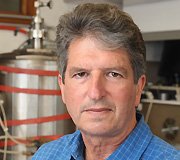Aug 25 2009
UNSW solar cell researchers have played the key role in achieving the highest efficiency for solar power, setting a new world record of 43 per cent of sunlight converted into electricity.
 Record-breaking ... Professor Martin Green
Record-breaking ... Professor Martin Green
The UNSW team, led by Scientia Professor Martin Green, Research Director of the UNSW ARC Photovoltaics Centre of Excellence, combined with two US groups to demonstrate a multi-cell combination which has set the new benchmark for converting sunlight into electricity by any possible approach.
“Because sunlight is made up of many colours of different energy, ranging from the high energy ultraviolet to the low energy infrared, a combination of solar cells of different materials can convert sunlight more efficiently than any single cell,” Professor Green said.
Professor Green, with colleague Dr Anita Ho-Baillie, led the team that developed a silicon cell optimised to capture light at the red and near-infrared end of the spectrum. That cell was able to convert up to 46 per cent of light into electricity. When combined with four other cells, each optimised for different parts of the solar spectrum, the five-cell combination converted 43 per cent of the sunlight into electricity, bettering the previous world record by 0.3 per cent.
“Our group’s silicon cell was the key contributor to the new result,” Professor Green said.
Professor Stuart Wenham, Director of the ARC Centre, said the new record was not directly comparable to the 25 per cent efficiency world record for an individual solar cell set by UNSW last year. However it was an important pointer for the future potential of solar photovoltaic power.
“This latest record involves an expensive combination of cells and the sunlight was focused to produce a much higher intensity than standard sunlight for these measurements. It does show, however, what eventually may be practical,” Professor Wenham said.